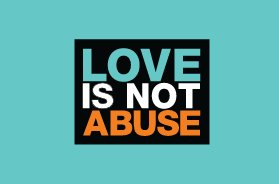
Teen Dating Violence Awareness Month
Throughout February, organizations and individuals nationwide are coming together to highlight the need to educate young people about dating violence, teach healthy relationship skills and prevent the devastating cycle of abuse. With their adult allies, youth activists achieved a major victory in 2005 and 2013 when the importance of addressing teen dating abuse was highlighted in the reauthorization of the Violence Against Women Act. Both Chambers of Congress have declared the entire month of February to teen dating violence awareness and prevention.
Each of the partners supporting Teen Dating Violence Awareness and Prevention Month believe that every young person deserves a safe and healthy relationship, no matter who they are or who they love.
A Silent Epidemic
We are living in a world where one in three students report experiencing some form of abuse, and more than 2/3 never report that abuse to a caring adult. A world where young people in more than 35 states still lack unfettered access to legal protection or other assistance to end an abusive relationship. A world where over 80% of school counselors report being unprepared to address incidents of abuse. This tells us - dating abuse isn't just a big issue. It's a growing epidemic.

How to Talk to Your Teen About Dating Violence
Teenage years are a time when fundamental understandings of life really begin to develop. It is in our teenage years that we begin to formalize how we approach, evaluate, and handle difficulties that life may throw at us. Teens also value a growing sense of independence and may shun advice or guidance from older people who have been in their shoes. This may be especially true for parents of teenagers. However, it is incredibly important to stay active in a teenager's life, monitor relationships for signs of danger, and understand how to approach sensitive issues.
Kids between the ages of 13 and 18 establish habits that will affect relationships for years to come. Unfortunately, teen dating violence is a serious issue that affects thousands of teens across the country. If you have a teenager who is in a relationship and suspect it is violent, unhealthy, or dangerous - take the time to talk to your child about teenage dating violence. Here are some suggestions to help you talk to your child about teen dating violence.
Establish Open Lines of Communication and Set Positive Examples
Teenagers take cues from their surroundings and the media they follow. If they see violent relationships in the home, on television, or in a movie they may normalize any violent or damaging behavior within their own intimate relationships. You can help teens recognize unhealthy, violent, or negative dating relationship behaviors by setting positive relationship examples. If you and your teen are watching a movie about domestic violence, use the opportunity to talk about what you see on screen. Even if it doesn't seem like your teen is listening, they are. They are hearing you on some level. Simply encouraging positive relationship habits - and pointing out negative behaviors - can help your teen shape positive habits and recognize unhealthy ones.
Talk to Daughters and Sons
Many parents may only look for signs indicating that their daughters are in abusive teenage relationships. However, it is equally as important to look for signs in both sons and daughters. Either can be the victim or perpetrator in violent teenage relationships. Staying attuned to behavioral changes in both sons and daughters is important. If you're teen is engaging in violence, then make sure you discuss the criminal consequences with them.
Talk to Your Teen Privately
If you suspect your teen is in an unhealthy or violent relationship, set aside a time to speak privately. Teens are very sensitive to the perceptions of others and may be embarrassed about their situation. Finding a private space where your teen is most comfortable can help to set the scene for a meaningful and exploratory conversation.
Acknowledge That Relationships are Difficult
As a parent, you have had at least one - if not more - relationship from which you can draw experience, knowledge, and wisdom. Relationships are hard work and require a lot of effort to be successful. Your teen, whether they have been dating for a few years or just testing the waters, are relatively new to relationships and have a lot to learn. Try to relate to the difficulties your teen may be experiencing in his or her relationship by confirming that you understand how much energy - both emotionally and mentally - a healthy relationship requires. It is easy for relationships to fail because resorting to unhealthy behaviors is easier than investing time, energy, and consideration.
Don't Be Afraid to Get Uncomfortable
Teens will be hesitant to talk about their intimate relationships. This hesitance may only increase if the relationship is unhealthy or violent. It may be uncomfortable to broach subjects of dating and sex at first, but doing so is incredibly important if you suspect something is wrong. Your teen is developing habits and expectations that will stay with them for life - don't shy away from ensuring these behaviors are positive because the subject is potentially embarrassing. Also, if you fear that your teen is engaging in teen dating violence, make sure they understand the potential criminal consequences.
Understand Your Teen's Relationship
If your teen is in a relationship make it a point to ask about his or her partner. Invest in the relationship and encourage your teen to tell you about their new interest. The better you understand your teen's partner the better you'll be able to evaluate the relationship. Once you establish a baseline for how the relationship operates, negative changes may be more evident. If you regularly ask your teen about his or her relationship they may feel more comfortable approaching you if becomes unhealthy.

